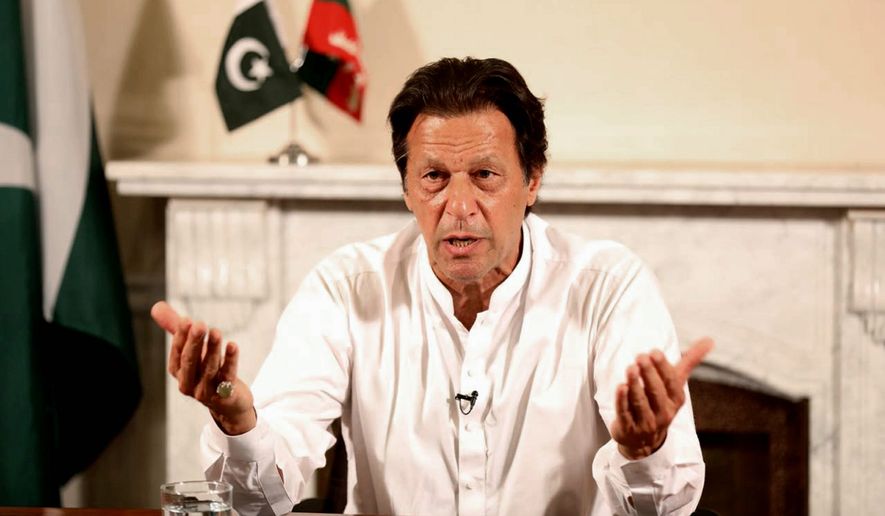President Trump has tweeted, as recently as this year, that the U.S. “foolishly” gave Pakistan tens of billions of dollars in aid over the decades, only to receive “lies & deceit” and failure to help fight terrorists in Afghanistan.
Prime Minister Imran Khan has called Mr. Trump’s criticisms of his country “ignorant and ungrateful” and complained repeatedly that Washington doesn’t appreciate Islamabad’s contribution to the war on terror.
But the mood and the conversation may be considerably warmer when Mr. Khan, a former cricket star, makes his first trip to the White House on Monday since his election 11 months ago. Oval Office talks with Mr. Trump are expected to center on the future of Afghanistan, counterterrorism, defense, energy and trade.
Pakistani Foreign Minister Shah Mahmood Qureshi, who will accompany Mr. Khan, told reporters in Islamabad that Pakistan sees the visit as a way to reset relations. The meeting itself is an “acknowledgment of the inherent importance” of better bilateral ties, he said.
The Khan government offered a pre-summit olive branch with the arrest Wednesday of Hafiz Saeed, a radical cleric and U.S.-wanted terrorist suspect implicated in the 2008 Mumbai attacks. Saeed was arrested in Punjab Province while traveling from Lahore to Gujranwala, Pakistani officials told The Associated Press.
Mr. Trump hailed the arrest on Twitter, but, like many other aspects of the U.S.-Pakistani relationship, it’s complicated. Saeed has been living openly in Lahore for years, preaching and even giving interviews to foreign media. U.S. and Indian officials have complained that Saeed has been detained repeatedly when Pakistan gives in to foreign pressure.
Analysts are not discounting the potential for surprises, and a discordant note or two, when Mr. Khan and Mr. Trump meet.
Moeed Yusuf, associate vice president of the Asia Center at the U.S. Institute of Peace, said the meeting is the least predictable in memory between leaders of the two countries, which are longtime wary partners in one of the world’s most volatile regions.
“Both individuals are very unconventional in how they approach diplomacy. Both like to not follow the bureaucratic script,” Mr. Yusuf said. “And, quite frankly, this is a relationship that has had so many ups and downs.”
A clash between the two countries came to a head last fall when Mr. Trump canceled $300 million in aid and tweeted that Pakistan would “take our money and do nothing for us.”
Mr. Khan shot back, “Instead of making Pakistan a scapegoat for their failures, the US should do a serious assessment of why, despite 140,000 NATO troops plus 250,000 Afghan troops & reportedly $1 trillion spent on war in Afghanistan, the Taliban today are stronger than before.”
Stabilized relations
Michael Kugelman, senior associate for South Asia at the nonpartisan Woodrow Wilson International Center for Scholars, said the relationship between the two countries and the two leaders has since stabilized and that Pakistan remains a key player in the Trump administration’s hopes to nail down a peace accord with the Taliban and remove U.S. troops from Afghanistan in the coming months.
Farhat Haq, professor of political science at Monmouth College and author of “Sharia and the State in Pakistan: Blasphemy Politics,” said it will be interesting to see how the two leaders, each with a record of global success before entering politics, will get along.
“If these two leaders can create some sort of understanding, I think that would be good. Or it could be a disaster,” Ms. Haq said. “I hope it’s not disastrous. I think the world needs a better relationship between these two leaders.”
Oval Office chats traditionally are meticulously prepared and scripted, but Mr. Yusuf said the meeting Monday could go either way, depending on the chemistry between Mr. Khan and Mr. Trump.
“They could hit it off very well, or it could be a bit of a personality clash,” Mr. Yusuf said. “If there’s a personality clash, I think there is a risk that they don’t get along and things unravel.
“If both leaders walk out of the room, having each other on speed dial and being able to reach out to each other directly to fix problems as they arise going forward, I think the trip would be successful,” Mr. Yusuf said.
Hassan Abbas, chair for the department of regional and analytical studies at the National Defense University’s College of International Security Affairs, said the meeting between the leaders of the U.S. and Pakistan is a good omen for bilateral relations and an opportunity to work on Afghanistan peace talks.
Pakistan was included in a joint statement released with the U.S., China and Russia on July 12 calling for a permanent cease-fire and the beginning of direct negotiations between the Taliban and the U.S.-backed government in Kabul. U.S. officials have long echoed Mr. Trump’s complaints that Pakistan, which shares a long, porous border with Afghanistan, has not done enough to rein in the Taliban and other radical Islamic militants who find refuge inside Pakistan.
“That joint statement provides the most clear evidence yet that the U.S. really does view Pakistan as a key player and facilitator and enabler in this very difficult but very important peace and reconciliation process in Afghanistan,” Mr. Kugelman said.
It has been nearly four years since then-Pakistani Prime Minister Nawaz Sharif paid an “official working visit” to Washington, according to the State Department.
The meeting between the current leaders “is extremely unpredictable,” Ms. Haq said. “I am so fascinated. I am really looking forward to seeing how they both interact with each other.”




Please read our comment policy before commenting.